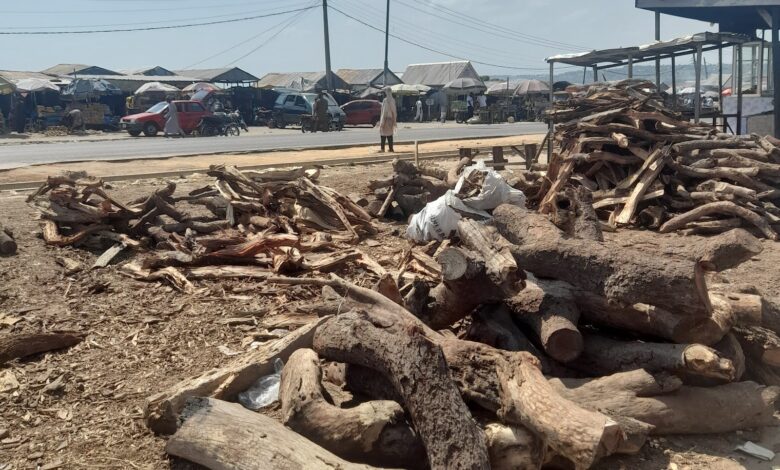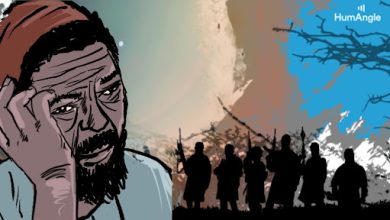Households, Businesses Face Unexpected Consequences Of Tree Felling Ban In Northeast Nigeria
While the tree felling ban in Adamawa State was founded on noble intentions, it has sent shockwaves through the local population and the businesses intertwined with the forest resources.

In late June of 2023, Adamawa state Governor, Ahmadu Umaru Fintiri, took a significant step that would reshape the environmental and economic landscape of the region. His announcement heralded a new era in the state’s approach to forestry.
In his speech, he declared a comprehensive ban on the reckless and unregulated felling of trees, targeting not only unauthorized logging but also the unrestricted cutting and exportation of trees. The motivation behind this bold move was to combat the looming crisis of deforestation, a crisis with far-reaching consequences affecting not just the environment, but the very fabric of society and the economy.
The rate of deforestation in Adamawa had reached alarming levels, pushing the state to a tipping point where the environment, local communities, and wildlife faced imminent threats. Governor Fintiri saw the ban as an essential response to ensure sustainable forest management, protect wildlife habitats, preserve soil, and mitigate the release of greenhouse gases into the atmosphere. His vision was one of long-term ecological benefits that would far outweigh any short-term economic costs incurred.
While the ban was founded on noble intentions, it sent shockwaves through the local population and the businesses intertwined with the forest resources. The abrupt prohibition disrupted the delicate equilibrium of a community heavily reliant on firewood for daily cooking, heating, and various wood-related products.
This story delves into the multifaceted impacts of the ban, highlighting the unforeseen challenges faced by the people as they adapt to a new way of life in a changing environment.
Ruining the Environment
Adamawa State is located in the northeastern geopolitical zone of Nigeria, bordered by Borno to the northwest, Gombe to the west and Taraba to the southwest, while its eastern border forms part of the national border with Cameroon.
The state has a population of over 4.2 million people. It is one of the heterogeneous states in Nigeria with over 100 indigenous ethnic groups. According to a survey conducted by the United Nations Development Programme (UNDP), over 70 per cent of Nigeria’s population relies on biomass fuels such as firewood, charcoal, and crop residues for cooking and heating.
The use of firewood for cooking and heating has been in practice for generations in Adamawa State and other rural areas across the country. The reasons for this type of dependency include inadequate access to modern energy sources, poverty, and cultural values that prioritize traditional practices.
However, the impact of deforestation on the environment cannot be overlooked. According to a report by the Food and Agriculture Organization of the United Nations (FAO), the excessive harvesting of wood causes Nigeria to lose between 350,000 and 400,000 hectares of forest annually.
Climate change is exacerbated by this deterioration, which also ruins the natural environment. Important carbon sinks disappear as forests are destroyed, and the extra carbon in the atmosphere that results increases global warming even more.
In Adamawa State, the consequences of over-reliance on firewood for cooking, heating and manufacturing wood-related products are also felt at the local level. The excessive tree-felling in the region has caused devastating negative impacts such as soil erosion and extreme flooding, resulting in loss of lives and properties.
In addition, the reliance on firewood also results in increased indoor air pollution, which can cause health issues such as respiratory problems and eye diseases. Despite these challenges, households continue to rely on firewood or its derivatives like charcoal (obtained from burning firewood) as a primary source of cooking fuel. In most cases, households collect firewood from nearby forests or purchase it from local vendors.
Mixed Reactions, Common Hardship
In the aftermath of the tree-felling ban, households find themselves grappling with the scarcity of firewood and/or charcoal. The sharp rise in prices has burdened families, particularly those living in poverty, increasing their struggle to meet the basic necessities of cooking.
Tijani Ali, a resident of the Badarisa area sheds light on difficulties imposed as a result of the ban. “It is increasingly difficult to afford firewood for my family as the price has almost tripled,” he lamented.
“We rely on firewood and charcoal for cooking as it is much more affordable compared to cooking gas and kerosene.
“I don’t even have a gas cylinder, not to even think about affording to buy cooking gas. The government should please look into this crucial matter.” Tijani went on to narrate how he has no option but to buy firewood even as expensive as it is now.
Like Tijani, several other people voiced out their concerns over the felling ban. Madam Godiya Musa, a mother of three residing at Bachure, Yola North local government, shares the burden she faces as she attempts to adapt to the ban’s consequences.
Madam Musa recounted the high costs, risks and challenges associated with using cooking gas as a substitute. “Apart from being very expensive, I am wary of the safety of using cooking gas. For me, charcoal or firewood is more affordable and safer,” she said. But with the ban, she said, prices of both charcoal and firewood have skyrocketed.
“I used to cook twice with a charcoal of 100 naira, but now it takes the grace of God for charcoal sold at 200 naira to even finish cooking a meal. This change is something big and worrisome,” she said.
Godiya pleaded with the government to come to their aid. When asked if there are other alternatives she explores, Madam Godiya responded “I do not have other alternatives, however, I cook once daily instead of twice or even 3 times as I used to before. I cook once now and my family gets to eat the same food throughout the day.”
Mrs Magdaline Barnabas, a resident of Sangere, Girei local government area of Adamawa state, voiced her concerns about the long-term consequences of indiscriminate tree-felling. While she recognizes and approves the need for conservation, Magdaline suggests that a complete ban on tree-felling may not be the solution.
She advocates for implementing sustainable logging practices combined with proactive tree-planting initiatives to strike a balance between the needs of the people and the environment. According to her, “It is important that our forests are conserved because we are suffering from global warming currently. The temperature gets extremely hot at times and our rivers dry up. Take the Benue River at Hayin gada, Girei for example, you cannot compare it to say a decade or more back.”
She however added, “As much as I am in support of the ban by the Governor, it is important that measures are put in place to ease the suffering of the citizens. The majority of Adamawa residents rely on firewood and charcoal for cooking and I really hope the state government will come up with something soon to ease people’s suffering.”
She explained that “If a tree is cut down by a licensed person, it should be made mandatory that more trees are planted to cover for the ones cut down in the years to come. With this, I believe our forests can be conserved even with tree felling”
The impact of the tree’s feeling ban is not only felt by households, businesses too share the brunt. Hassan Dandi, a carpenter at Doubeli, Jimeta-Yola who makes chairs, tables, wardrobes and all wood-related products has lamented a decline in purchases as well as an enormous increment in prices of wood.
He told HumAngle, “I pay double the amount to purchase a 2 by 2 plank of wood now compared to when the ban wasn’t imposed. This has affected my business as I have no option but to increase the prices of my products also which has resulted in decreased patronage. Whether or not a positive change will come soon, only God knows”
He added, “This is my one and only means of survival. If I stop this business today due to lack of patronage, where should I resort to? Even though there is low patronage, I am still in business and I just pray things get better soon because it is really not easy”.
Gambo Marvin, an environmental activist and a resident of Karewa, Yola North, known for his unwavering dedication to conservation, contrasts the short-term hardships with the potential long-term benefits of the ban.
Marving emphasized the urgent need for the community to adopt renewable energy sources as a viable solution. He said “The people of Adamawa State should unite in exploring renewable options, breaking the cycle of dependency on firewood and paving the way for clean and sustainable energy sources utilizing biomaterial wastes”
He explained that “Adamawa is an agrarian state and as such, there are lots of biomaterial wastes that can be utilized for making alternative sources of fuel such as the charcoal briquettes made from groundnut shells, coconut shells, rice and corn husks and many more. These when utilized can serve to cushion the effect of the ban.”
Organization’s Action
Organizations like the Strategy for Peace and Humanitarian Development Initiative (SPeHDI) are playing their parts in providing alternative and sustainable sources of cooking fuel known as charcoal briquettes (made from biomaterial wastes like coconut shells, groundnut shells, rice and corn husks, peels from oranges and even dried leaves) even before the tree felling ban was imposed in the state of Adamawa.
Now that the ban is in place and has resulted in untold hardship, the organization plans on expanding its reach to wider areas of the state. Speaking with the Executive Director of the organization, Mrs. Kauna Hamman Kaletapwa, told HumAngle that “we have trained over 200 women and girls in the production of charcoal briquettes which is a clean source of cooking fuel from biomaterial wastes rather than felling of trees.”
She explained that “the biomaterials are sourced locally and are readily available. The recent ban has made us expand our reach and hopefully, with other collaborations and support, we can be able to proffer a solution that can serve to mitigate the hardship as a result of the felling ban.”
Obidah Habila Albert is a 2023 HumAngle Accountability Fellow
Support Our Journalism
There are millions of ordinary people affected by conflict in Africa whose stories are missing in the mainstream media. HumAngle is determined to tell those challenging and under-reported stories, hoping that the people impacted by these conflicts will find the safety and security they deserve.
To ensure that we continue to provide public service coverage, we have a small favour to ask you. We want you to be part of our journalistic endeavour by contributing a token to us.
Your donation will further promote a robust, free, and independent media.
Donate HereStay Closer To The Stories That Matter




